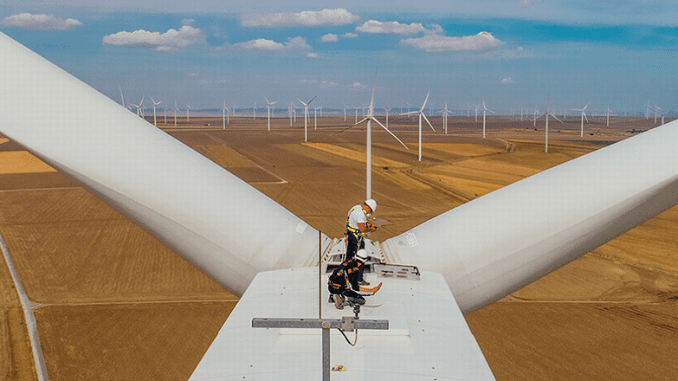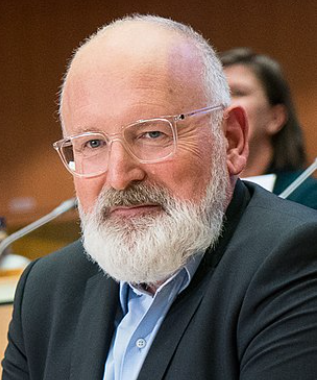
BRUSSELS, Belgium, December 14, 2021 (ENS) – Today, the European Commission issued policy guidance for a “fair and inclusive transition towards climate neutrality” to complement the package on delivering the European Green Deal presented in July.
The European Green Deal, launched in 2019, sets out the European Union’s strategy to become the first climate-neutral continent and transform the EU into a sustainable, fairer, and more prosperous society that respects planetary boundaries. The need for a fair transition is an integral part of the Green Deal, which emphasized that no person and no place should be left behind.
Frans Timmermans, executive vice-president for the European Green Deal and European Commissioner
for Climate Action, said, “With the Green Deal we will create a modern, sustainable economy with jobs that last for decades to come. Europe’s transition to climate neutrality will not be easy and we need to have policies across the economy that bring everyone along.”
“Today we complement our proposals on the Social Climate Fund, the Just Transition Mechanism and others with additional policy guidance to make sure we leave no one behind on our path to a healthy, green, and fair future,” Timmermans said.

The Recommendation to the European Council proposed by the Commission sets out specific guidance to help the 27 EU Member States devise and implement policy packages that ensure a fair transition towards climate neutrality, by addressing the linked employment and social aspects.
The Council, composed of the 27 EU heads of government, the President of the European Council and the President of the European Commission, defines the overall political directions and priorities of the European Union.
This Recommendation addresses the needs of the people and households that are heavily dependent on fossil fuels and could be most affected by the green transition. It invites Member States to make optimal use of public and private funding and work in close cooperation with social partners during the transition.
Fairness and solidarity are defining principles of the European Green Deal, the Commission said in its . Policy actions to support people and their active participation are key to a successful green transition. With the right actions and policies in place, the green transition has the potential to create an additional million jobs by 2030 in the European Union and some two million jobs by 2050.
Commissioner for Jobs and Social Rights Nicolas Schmit said, “The Green Deal is an economic and climate imperative, and we all have to collectively ensure its success. But we do not underestimate the social and employment impact of the green transition. Social fairness must be at its heart, reflecting the values of the European social market economy.”
“This policy guidance provides detailed, tangible ways for Member States, regions and local communities to protect the people who are at risk of poverty and social exclusion, as well as to enable people to make the most of the opportunities that the climate transition offers,” Schmit said.
The Commission emphasized that the EU must put people “at the heart of the green transition.”
Today’s proposal encourages Member States to take measures and actions adapted to their particular circumstances:
- – Measures to support quality employment and facilitate job-to-job transitions. This includes, for instance, offering tailored job search assistance and promoting job creation, and facilitating access to finance and markets for micro, small and medium-sized businesses, in particular those contributing to climate and environmental objectives.
- – Measures to support equal access to quality education and training. This concerns developing up-to-date intelligence on skills needs in the labor market, providing high-quality and inclusive education and training on skills and competences relevant for the green transition, and increasing adult participation in lifelong learning.
- – Measures to support fair tax-benefit and social protection systems. The proposal invites Member States to assess and, where necessary, adapt these systems, for instance by further shifting the tax burden away from labor towards other sources contributing to climate and environmental objectives.
- – Measures to support affordable access to essential services. Member States are invited to continue to mobilise public and private financial support to invest into renewable energy, tackle mobility challenges and promote cost-saving opportunities linked to the circular economy.
- – Measures to coordinate policy action, follow a whole-of-economy approach, and actively involve social partners, civil society, regional and local authorities and other stakeholders. Measures to further strengthen the evidence base and advance the consistency of definitions and methodologies are also important to improve the targeting of social and labor market policies.
- – Optimal use of public and private funding. Member States have a wide range of EU and other funding at their disposal to implement the necessary measures for a fair transition to climate neutrality.
The proposed Social Climate Fund of €72.2 billion in particular will support vulnerable households, transport users and micro-enterprises affected by the introduction of emissions trading for fuels used in road transport and buildings. It will be funded by the revenues of the EU carbon emissions trading system.
Other available EU funding under NextGenerationEU includes the Just Transition Mechanism and the European Social Fund Plus (ESF+), the EU’s main instrument for investing in people, with its budget of €99.3 billion in 2021-2027.
Executive Vice-President for an Economy that Works for People Valdis Dombrovskis said, “To protect our planet and future generations, we must build a sustainable economy that works for everyone. The green transition has significant economic and job creation potential.”
“It is essential that we make the most of the opportunities offered by the green transition, while making sure it is fair and inclusive so that no one is left behind,” Dombrovskis said. “For this, we must invest in skills, quality jobs and affordable services.”
Featured image: Wind turbines in Romania, one of the 27 EU Member States. The EU wants wind energy to provide half of Europe’s electricity by 2050. On May 26, 2021, the Romanian Wind Energy Association launched a Code of Good Practice for Renewable Energy in Romania, which will facilitate that goal. (Photo courtesy WindEurope)
© 2021, Environment News Service. All rights reserved. Content may be quoted only with proper attribution and a direct link to the original article. Full reproduction is prohibited.



